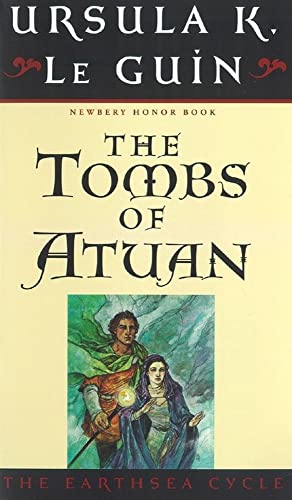Azalea Forrest reviewed The Tombs of Atuan by Ursula K. Le Guin (Earthsea Cycle, #2)
Review of 'The Tombs of Atuan (Earthsea Cycle, #2)' on 'Goodreads'
4 stars
The Tombs of Atuan is Book #2 in The Tales of Earthsea, a high fantasy series by Ursula K. Le Guin. Tombs is about a young girl named Tenar, who is taken from her home to become a priestess in the middle of a desert, where nothing ever seems to change, and the world outside is something evil, and to be feared.
I would have at first complained that the first 40% or so of The Tombs of Atuan is quite slow. And it’s true, I struggled to push forward. Comparing it to Ged’s adventure in The Wizard of Earthsea, to see a young girl taken from her home and turned into the head priestess/human goddess of darkness, things were bleak, and slow, and dull. But that was the point.
As I got to the middle, I ate the rest of the book up with vigor. I love Tenar. She embodies so much of what it is to be a person struggling with a broken identity and a sense of loss. And yet she has such strength. As Ged tells her: she is a light in the darkness. And Ged, too, I adore. He is so calm and powerful, and all he asks is that Tenar trusts him. When she finally sees his strength, when her old life crumbles before her very eyes, it was truly an emotional experience. “Trust me.” What weight those words carry.
I love the darkness in the series thus far. Not only is it a physical entity, but it is also the darkness within us. Hopelessness, depression, the loss of faith. Oppression. Whether an outside force or otherwise, it is all connected. It is truly beautiful and terrifying.
In Le Guin’s Afterward, she says that feminists might argue that Tenar is shown to be another heroine in need of a man to save her. But she explains this is not so, and I agree completely: One could not have saved themself without the other. Tenar, the only one with the knowledge of the tombs, needed to see the outside world in the form of Ged in order to even think of saving herself. And Ged, with the power to fight off the darkness (and only for a time), could not have escaped without her knowledge and care for saving his life. I doubt that he would have ever left without her after meeting her. Not because it was he who had to save her, but that her world was so cruel that he could not live with himself to have done otherwise.
The second to last chapter, I got really emotional when Ged told Tenar that he could not stay with her. She asks, unable to meet his eyes, and he says no. He would cross the ends of the earth for her, but he could not stay. He has callings elsewhere. It is. Sad as f*ck. Le Guin doesn’t explain it, doesn’t go into detail, merely shows Ged looking off into the distance, and Tenar going inward, going silent.
I cried for several pages of the next chapter, just because of that one scene. It was as if they had already said goodbye, like they were already parting ways, even though it was not the end. I hate goodbyes. She had learned to trust this man, the only person away from the only life she had ever known, and now it felt as though he was abandoning her. (He was not, but to a child and even to my child’s heart, it felt like it.) They finally reach Ged’s boat and he can tell that she is pained, but they both go silent, and Ged goes into a trance. The darkness tries to swallow her: it is still here, still so far away from the broken, crumbled Tombs of Atuan, inching ever closer, to commit one final act of evil: to kill Ged, because after all, he tricked her. Forced her to leave the only life she knew, only to abandon her. She hides the knife behind her back, and Ged opens his eyes, sees her, and we all know that he knows the knife is there. But he gets up, seemingly energized, and speaks. And his voice melts the darkness away. Despite the pain. Despite that feeling of betrayal. She loves Ged. She is sad, but she loves Ged.
Goodbyes are so, so hard. Even if they aren’t forever, they can feel as if they are so. I am glad, at least, that their temporary goodbye is not how the book ends.
The Tombs of Atuan reads simple at times, but it leaves plenty of room for the imagination. Even a simple phrase, “I cannot stay with you”, was enough to bring me to tears. Oh, Tenar, you poor girl. Maybe I’m just a sucker for sentimentality, but the second half made up for any misgivings I may have originally given the first.

